Latent Semantic Indexing, or LSI, keywords are a point of contention within the SEO community. It’s easy to get confused about what these are and whether they’re something that actually helps your website to rank higher on Google or not.
There’s no denying that there are an awful lot of misconceptions about these and the claims that are made about them.
We want to clear up this confusion and help you to understand what LSI keywords are and whether or not they matter. In this guide, we’ll take a deep dive into LSI keywords, specifically looking at:
What Are LSI Keywords?
LSI (Latent Semantic Indexing) keywords are words that are related to a main keyword and are seen as semantically relevant. If your page’s primary keyword is ‘credit cards,' then LSI keywords would be things like “money,” “credit score,” “credit limit,” or “interest rate.”
They're not synonyms (different words that mean the same thing), though. They're closely related words that help to define the topic of a page.
At Semrush, we use 'semantically related words,' and if you want your web pages to rank on the SERPs, you can't ignore the importance of including these within your content.
Google has moved beyond indexing a page based on single keywords (which is what used to happen). Its algorithms use closely related keywords to give context to content, especially when there is ambiguity.
Step back in time, and Google would look for references on a keyword on a page to determine the relevance to the query. Back to our example above, if your page is about credit cards, then this keyword is what would be used to determine relevancy, and, in a simplistic form, the more mentions, the better.
However, this wasn't an accurate way to determine the relevance of a page and led to keyword stuffing and an obsession over keyword density and the evolution of the search engine to understand how semantically related words help to define a topic better than the number of times a keyword is mentioned.
Now, in 2021, there's no escaping the fact that you need to be optimizing for topics, not just single keywords, something that becomes apparent when analyzing the search queries that a top-performing page ranks for.
Just take a look at the page below that's ranking for 2.2k different keywords if you want to see proof of this:
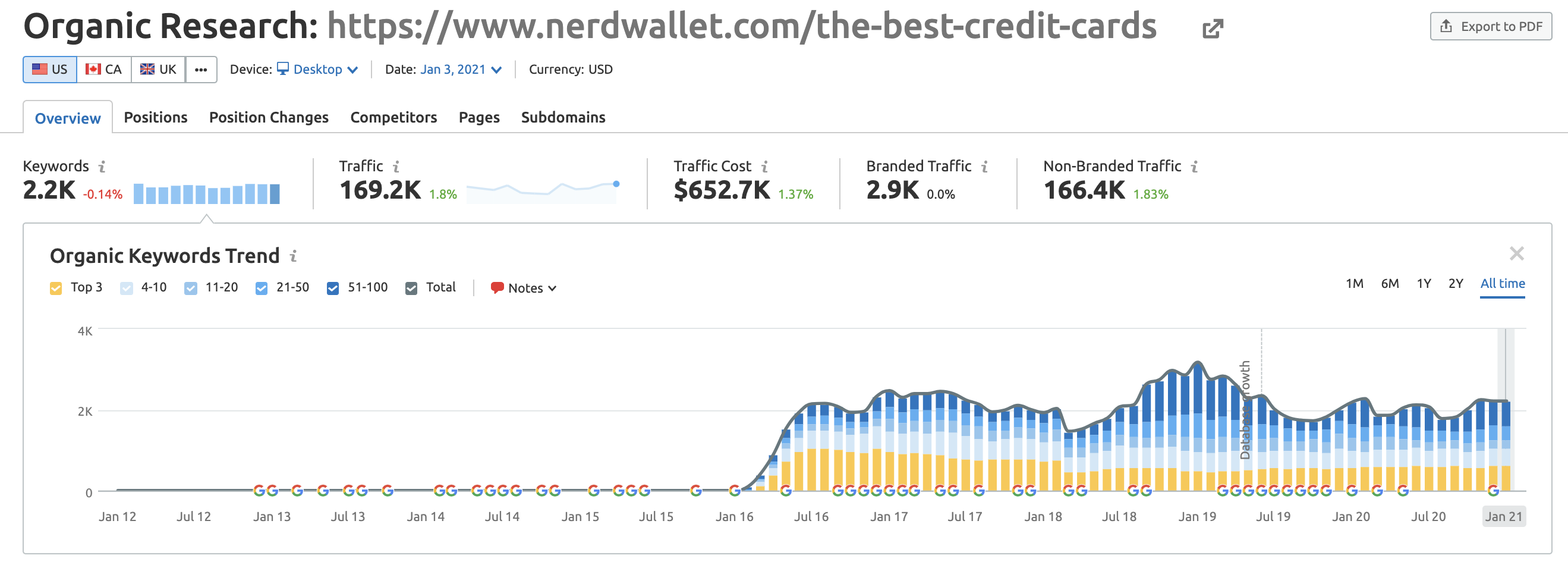
So then, why the debate around LSI keywords?
It all comes down to the fact that Google has confirmed that these don't exist on several occasions. Also, we've posted about the topic at length and that it's a myth as well.
But let's not take this out of context. Using related keywords in your content is important, and doing this is part of launching a page that comprehensively covers a topic is the key to success.
It’s just that calling these LSI keywords isn’t necessarily right, rather than the concept of what is inferred in this.
And even though LSI keywords don't exist in a true sense, understanding Latent Semantic Indexing can certainly help you create better content that ranks well on the SERPs.
What Is Latent Semantic Indexing?
Also known as Latent Semantic Analysis, LSI is a Natural Language Processing (NLP) technique developed in the 1980s to identify the contextual relationship between words.
In short, Latent Semantic Indexing “finds the hidden (latent) relationship between words (semantics) and in order to improve information understanding (indexing).”
Understanding the content of a page can help determine the topic based on the way language is used.
In theory, it makes sense that Google could use this technique to understand synonyms in particular and that using these throughout a piece of content would help the search engine better figure out the topic.
And the controversy that surrounds the use of the phrase “LSI keywords” isn't so much aimed at the importance of writing content that talks about the things you'd expect to see on a page about any given topic, but rather that there's no evidence that Google uses Latent Semantic Indexing for this purpose.
LSI is now old technology and was developed for smaller document sets, not the entire web.
That said, semantics is key to the way search engines understand a page of content. There's no denying that writing in-depth on a topic should involve the use of semantically related words and synonyms.
Google vs. LSI Keywords
As we’ve already mentioned, Google has confirmed that LSI keywords don’t exist, and other SEO community members also echo this.

And to understand this comment in a little more detail, let's take a look at this post by Bill Slawski on the topic of whether or not Google uses LSI.
We can understand from Bill's analysis on the topic that, as outlined above, LSI is old technology (one that, in fact, has been around since before the web), but that the reason why it's often spoken about in the context of SEO is how Google can understand synonyms and semantically related words.
In fact, if we take a look at the original LSI patent, we can see that:
Because human word use is characterized by extensive synonymy and polysemy, straightforward term-matching schemes have serious shortcomings–relevant materials will be missed because different people describe the same topic using different words and, because the same word can have different meanings, the irrelevant material will be retrieved.
Straightforward term-matching isn't an effective way to index content on the web.
But just because Google is looking to understand these when indexing a web page, that doesn't mean that Latent Semantic Indexing is the technology used. Not at all, and further evidence that Bill shares include Google papers on semantic topic modeling that do not reference LSI.
However, just because there's no evidence that Google uses Latent Semantic Indexing as the technology to understand the relationship between words and figure out the topic of a page, that doesn't mean it isn't being done another way. We can be certain that the content that ranks at the top of the SERPs usually covers a topic in sufficient depth and demonstrates authority and expertise.
Whether or not LSI Keywords is the right way to phrase it, it's clear that you need to be carefully considering the words you use to help Google understand your content topic.
LSI Keywords in Practice
Now that we've looked in a little more depth at what LSI keywords are let's look at what these are in practice and what they mean when creating and optimizing content.
LSI Keywords Are Not Synonyms
It's important to understand that LSI keywords are NOT synonyms.
A synonym is a word that means the same as another and can be used in its place. But on their own, some synonyms lack context.
An example of a synonym without context is the word “fall.” This could mean the season (Autumn) or the physical act of falling. On its own, it's difficult to infer the context that a word is used in.
But introduce semantically related words into a page of content, and it makes sense.
The word fall that's used in the context of a season makes sense when other words on the page include things like leaves, trees, weather. These aren't synonyms but related words that infer the meaning. In many cases, related words could help to define a topic without even mentioning it.
Talk about gas around content about cars, miles, roads, and again, there's no confusion on the topic or the meaning of the word.
From an SEO perspective, this means that search engines build up an understanding of the words that it expects to see on a page that talks about a particular topic, and where the importance of using these within your content comes from.
For example, how could you expect Google to rank your content as the most relevant page on the web for a query if you don't mention the things that the other pages do? You need to be using semantically related words within your content to demonstrate relevance, and in short, that's the goal of using what's known as LSI keywords.
How To Find Semantically Related Words for Your Content
So, how do you find semantically related words to use in your content? Here are five approaches you can use when you're carrying out keyword research to find ways to ensure you're talking about the right things on your pages and that you're able to include those words that would expect to be found in content about the topic:
Analyze Related Searches on Google Analyze Google Autocomplete Analyze People Also Ask Results Use the Semrush Keyword Magic Tool Use The Semrush SEO Content Template ToolAnalyze Related Searches on Google
Head to Google and run a search for your page's main keyword. Keeping to our previous example, we'll use 'credit cards' again.
Scroll down to the bottom of the SERPs, and you'll see a 'Searches related to credit cards' section.

And if we run the same for 'iPhone case' we see:
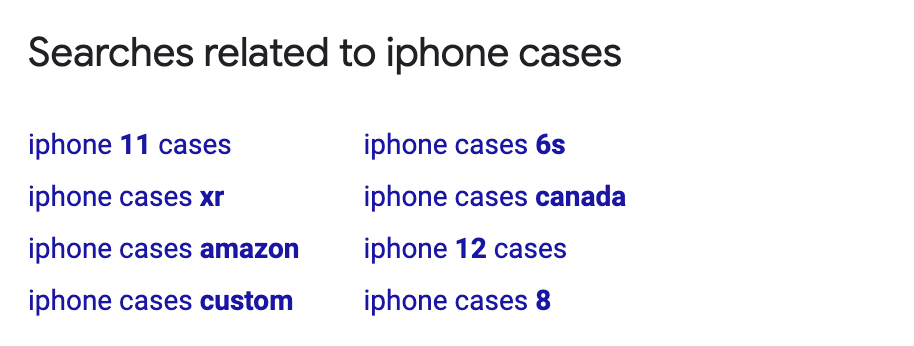
Use these topics and keywords as inspiration for additional topics to talk about within your content.
Of course, use common sense and pick out those that make sense to be included in your content. In the example above, you wouldn't want to include mentions of 'Canada' if you're selling in the U.S. or 'custom' if you're not selling custom cases.
These can also spark other ideas for things to reference on a page.
Analyze Google Autocomplete
Google Autocomplete is another great way to find related keywords to use within your content, and it takes just seconds.
Head to Google and enter your main keyword but don't hit search. Instead, take a look at the autocomplete results that are returned.
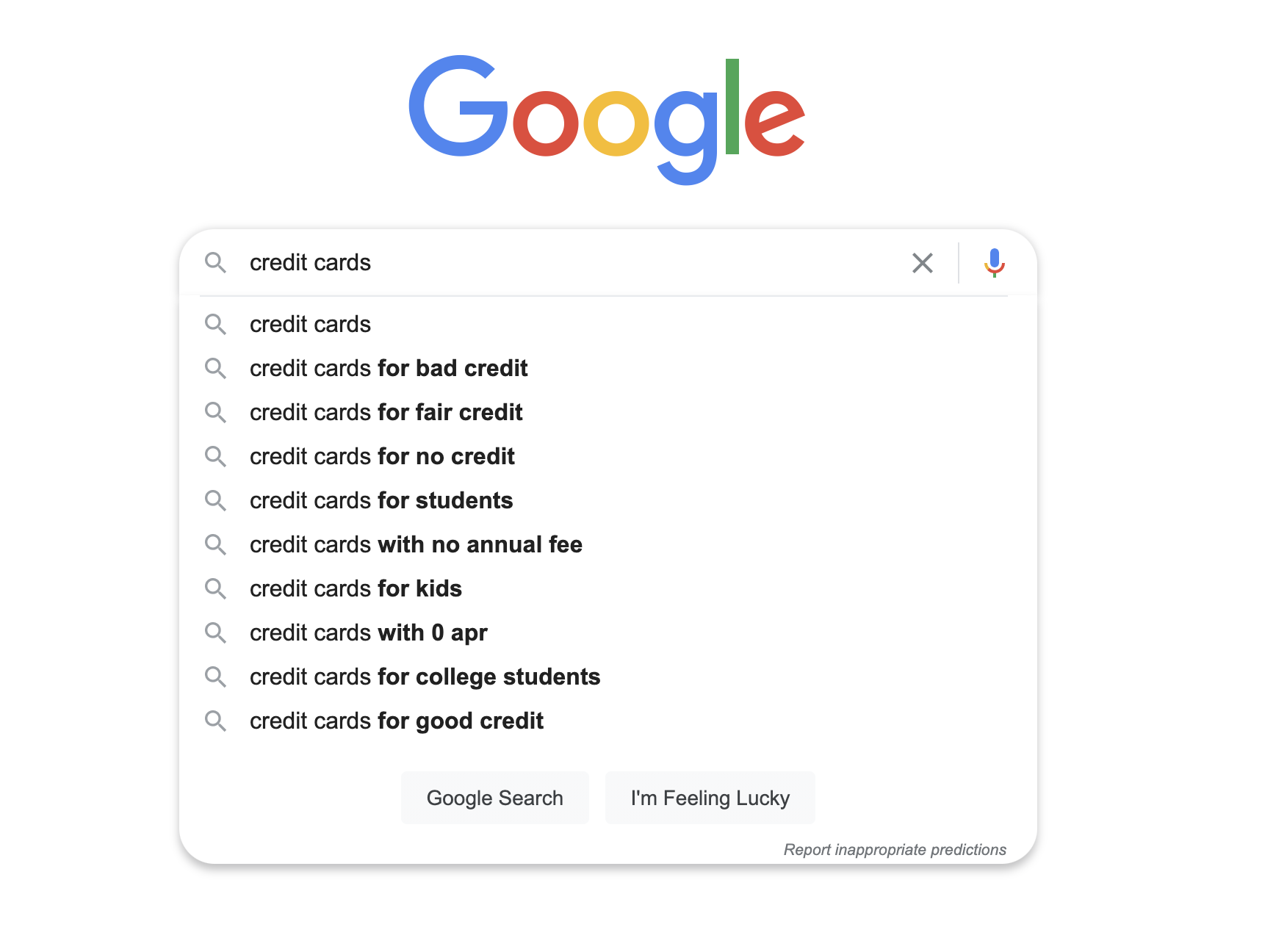
Analyze People Also Ask Results
Just as related searches on Google can be a great way to find related keywords to include within your content, you can also analyze the People Also Ask results for further ideas.
Not familiar with what these are?
“The People Also Ask box is an interactive, universal search result from Google that will display a box of questions that other searchers have asked in relation to your original search.”
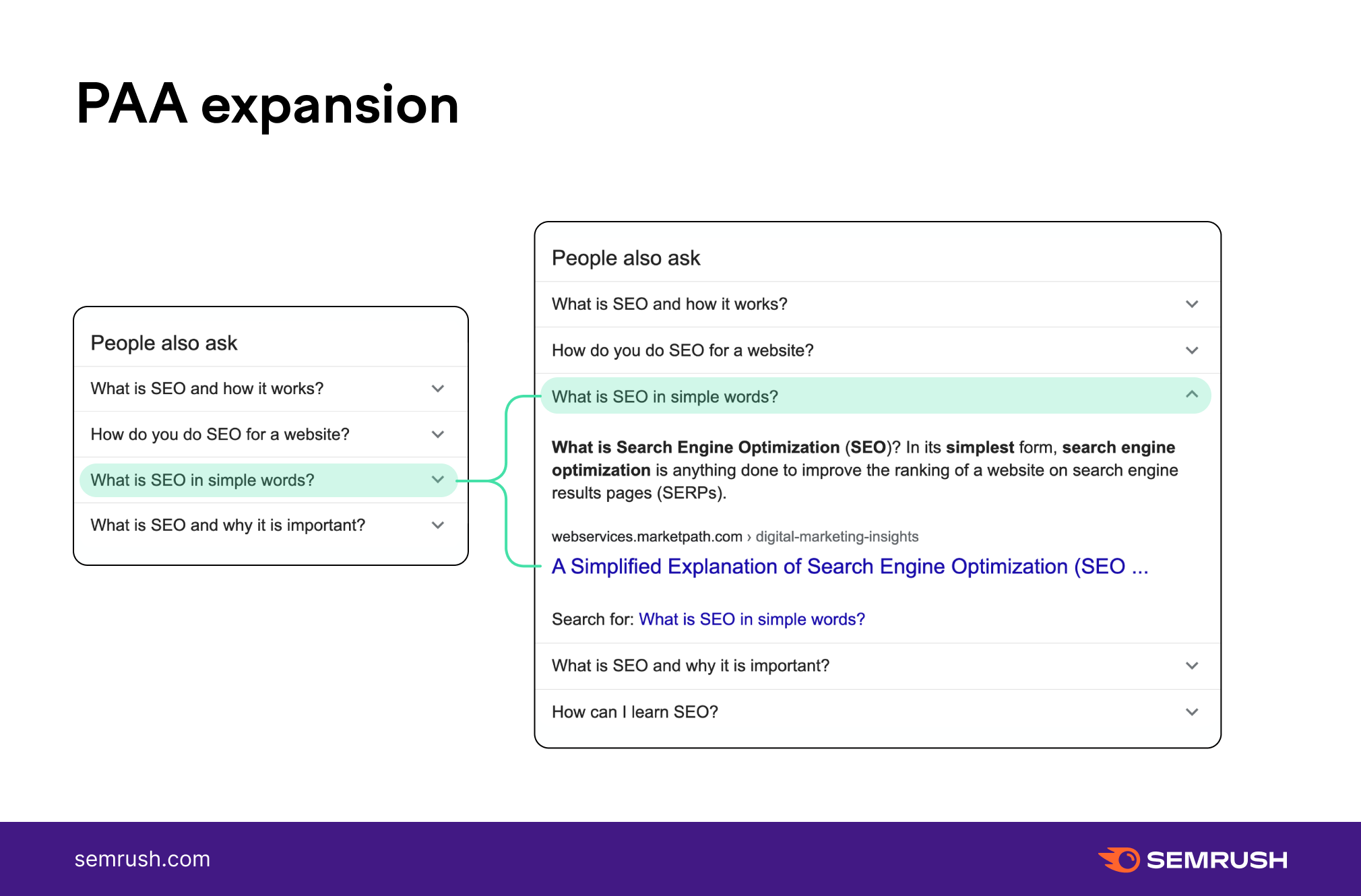
Analyzing these results is really easy and can be done using the AlsoAsked.com tool.
Enter your main keyword, wait a few moments, and you'll see how the PAA boxes expand out, giving you ideas for semantically related words to use.
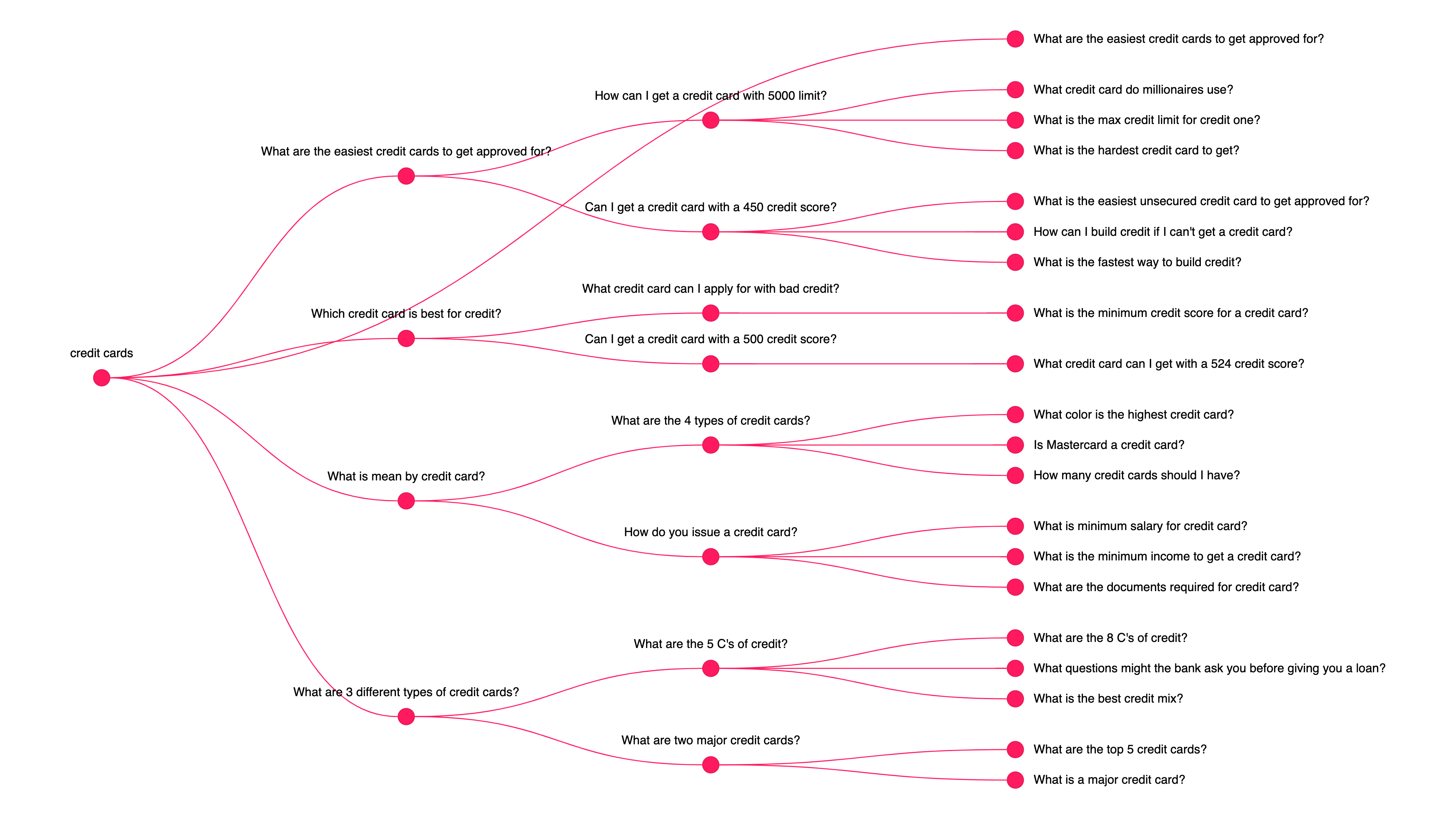
Use the Semrush Keyword Magic Tool
Head to the Semrush Keyword Magic Tool and enter your main keyword to see a list of keyword ideas.
Hit the 'related' tab at the top of your screen to see a list of keywords similar to the seed keyword you entered into the tool.
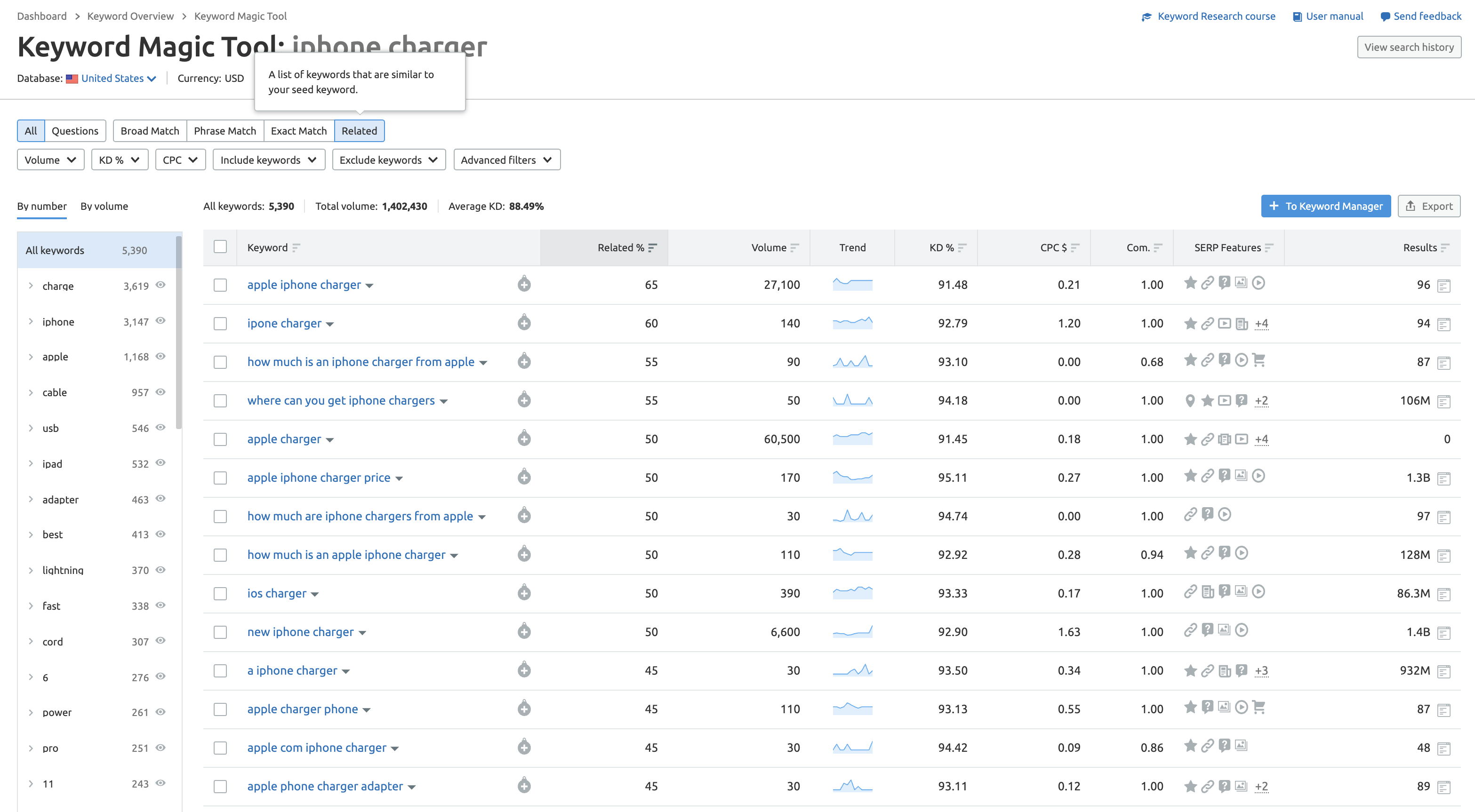
Use The Semrush SEO Content Template Tool
The Semrush SEO Content Template Tool is another great source for finding the main semantically related words based on your target keyword's top pages ranking(s).
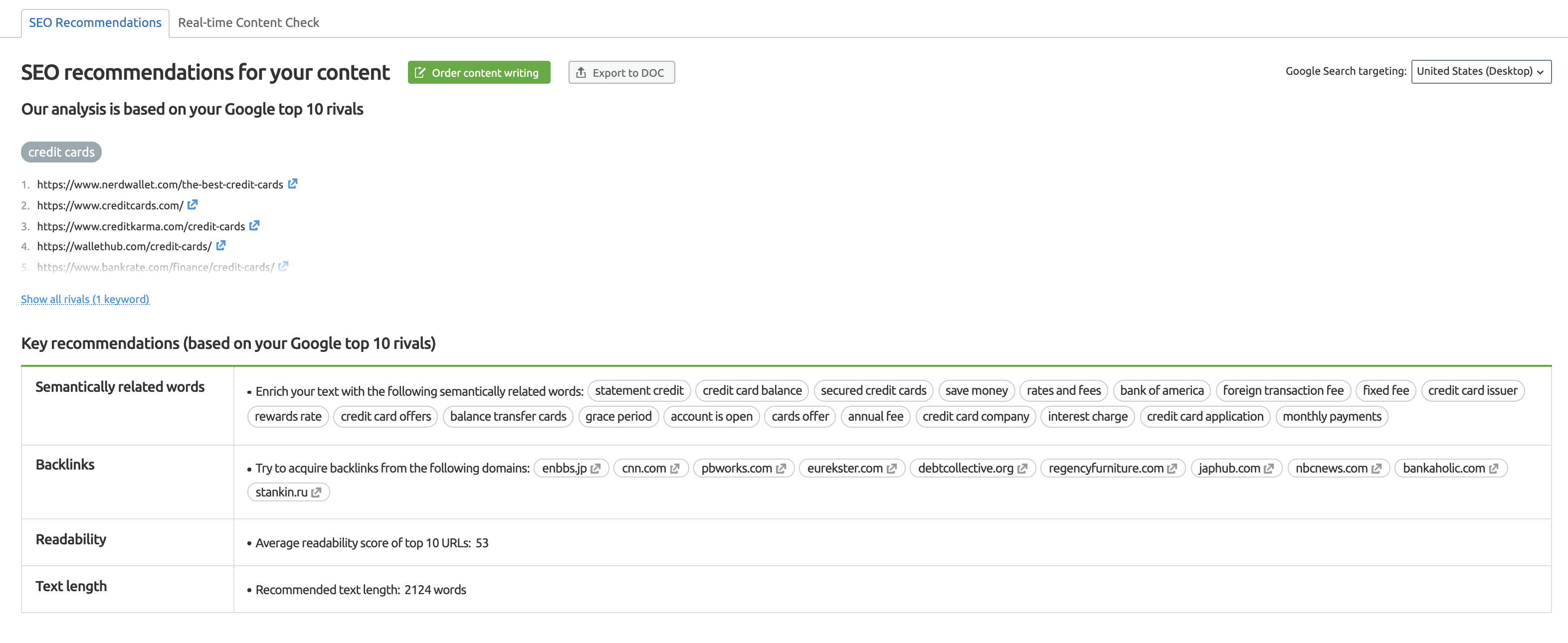
See the 'key recommendations' box and the 'semantically related words' section?
These are based on your top 10 rivals on Google for these keywords. Ensure you include these within your content to ensure you're talking about the same topics and using the same words as those pages that already rank.
Despite an ongoing debate within the SEO community about whether LSI keywords are real, there's no denying that you should be using semantically related words within your content.
Include steps to find these within your keyword research process and brief your writers with these as related words that should be used. Just be sure to communicate what these are and use them to enhance your content's topical relevance.
Innovative SEO services
SEO is a patience game; no secret there. We`ll work with you to develop a Search strategy focused on producing increased traffic rankings in as early as 3-months.
A proven Allinclusive. SEO services for measuring, executing, and optimizing for Search Engine success. We say what we do and do what we say.
Our company as Semrush Agency Partner has designed a search engine optimization service that is both ethical and result-driven. We use the latest tools, strategies, and trends to help you move up in the search engines for the right keywords to get noticed by the right audience.
Today, you can schedule a Discovery call with us about your company needs.
Source:





![How to Find Low-Competition Keywords with Semrush [Super Easy]](https://new.allinclusive.agency/uploads/images/how-to-find-low-competition-keywords-with-semrush-super-easy.svg)